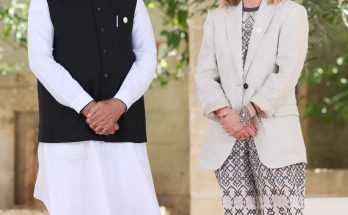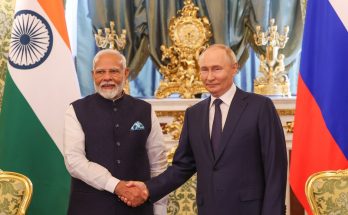 In an important move, Japan, a non-proliferation hawk and the only nation to have been attacked by atomic weapons, has signalled its strategic intent to transform ties with India by agreeing to speed up the conclusion of a bilateral deal that will enable the export of Japanese nuclear technologies to Asia’s third largest economy.
In an important move, Japan, a non-proliferation hawk and the only nation to have been attacked by atomic weapons, has signalled its strategic intent to transform ties with India by agreeing to speed up the conclusion of a bilateral deal that will enable the export of Japanese nuclear technologies to Asia’s third largest economy.
Natural Partners
Against the backdrop of perceived Chinese assertiveness in the Asia-Pacific region, the two Asian democracies have agreed to strengthen their security and maritime cooperation and described themselves as “natural and indispensable partners.”
Prospects of civil nuclear cooperation, bolstering security ties and jointly shaping the evolving Asia-Pacific architecture were among key issues that figured in wide-ranging discussions between India’s Prime Minister Manmohan Singh and his Japanese counterpart Shinzo Abe in Tokyo May 29.
Nuclear Entente
Armed with a vision of an economically resurgent and assertive Japan, Abe has made upgrading ties with India a key foreign policy priority. The China challenge seems to be an important propellant in the accelerating India-Japan ties, but even if one were to leave aside Beijing, the powers-that-be in both countries see enough win-win opportunities in the economic arena to recast their relationship.
The attempt at nuclear rapprochement, therefore, acquires greater traction as Tokyo was among the more vocal critics of India’s 1998 nuclear tests, but the bilateral relations have since then been upgraded systematically and incrementally.
A joint statement at the end of the talks said the two prime ministers reaffirmed the importance of civil nuclear cooperation, while recognising that nuclear safety is a priority for both governments. “In this context, they directed their officials to accelerate the negotiations of an Agreement for Cooperation in the Peaceful Uses of Nuclear Energy towards an early conclusion,” said the May 29 statement.
The road ahead is not going to be easy, given a powerful lobby of nuclear hawks in Japan and the insistence, at least officially, by Japan that India first sign the Nuclear Non-Proliferation Treaty and Comprehensive Test Ban Treaty (CTBT). Tokyo’s hesitation is understandable, but it also knows fully well that New Delhi will not budge from its oft-repeated position that both NPT and CTBT are discriminatory and, therefore, unacceptable to it. It looks like the business impulse will eventually triumph over the non-proliferation theology as top Japanese nuclear companies like Hitachi and Toshiba don’t want to lose a share of the lucrative civil nuclear market, with India nurturing ambitious plans to scale up the share of atomic electricity in the country’s overall energy mix.
This realisation perhaps explains why Japan has agreed to jointly work with India to make it a full member of international export control regimes like the Nuclear Suppliers Group, the Missile Technology Control Regime, the Australia Group and the Wassenaar Agreement. The template that it’s better to get India inside the tent, perfected during fractious debates in Washington, when the India-US civil nuclear deal was vigorously attacked by nuclear ayatollahs, seems to be finding favour in Tokyo as well.
Yes, We Can
Abe, for one, has exuded sincere optimism on this front. “In the political and security area, maritime security cooperation will further be strengthened … On civil nuclear cooperation, negotiation will be accelerated toward the early conclusion of the agreement,” Abe said in Tokyo. For India’s Manmohan Singh, there is plenty to be pleased with his four-day trip to Tokyo, one of the longest stays by an Indian prime minister in a foreign country.
Multi-alignment: Juggling Beijing and Tokyo
It’s been a fortnight of intense high-wire diplomacy for Manmohan Singh as he hosted China’s Premier Li Keqiang in New Delhi barely a week ago. The India-China talks happened in the shadow of a tense border stand-off, but culminated in a joint assertion that India and China are partners, not rivals. The talks in New Delhi and Tokyo with the leaders of China and Japan, who are locked in a bitter territorial spat over the disputed Senkaku/Diaoyu islands, underlines a new trend of flexibility and multi-alignment in India’s foreign policy that seeks to juggle and blend seemingly contradictory relationships to protect India’s larger national interests.
Author Profile

- Manish Chand is Founder-CEO and Editor-in-Chief of India Writes Network (www.indiawrites.org) and India and World, a pioneering magazine focused on international affairs. He is CEO/Director of TGII Media Private Limited, an India-based media, publishing, research and consultancy company.
Latest entries
 India and the WorldJuly 9, 2024Defying West, India sets $100 billion trade target with Russia
India and the WorldJuly 9, 2024Defying West, India sets $100 billion trade target with Russia India and the WorldJuly 5, 2024India at SCO: Takes swipe at Pakistan for cross-border terror, pushes alternative to BRI
India and the WorldJuly 5, 2024India at SCO: Takes swipe at Pakistan for cross-border terror, pushes alternative to BRI India and the WorldJune 14, 2024Modi’s Day 1 in Italy: Bonding with Britain, France
India and the WorldJune 14, 2024Modi’s Day 1 in Italy: Bonding with Britain, France India and the WorldJune 13, 2024G7 summit in Italy: Modi to showcase India as leader of Global South
India and the WorldJune 13, 2024G7 summit in Italy: Modi to showcase India as leader of Global South






